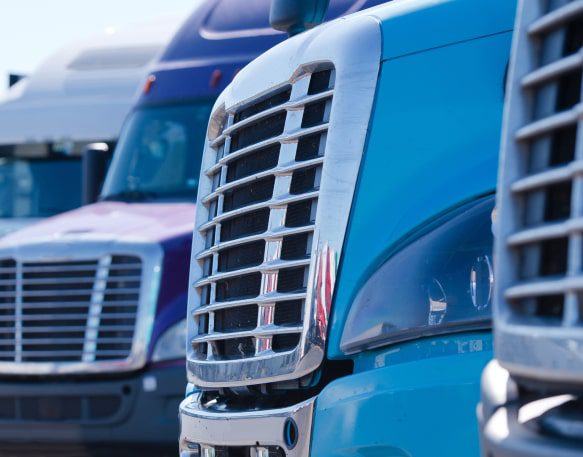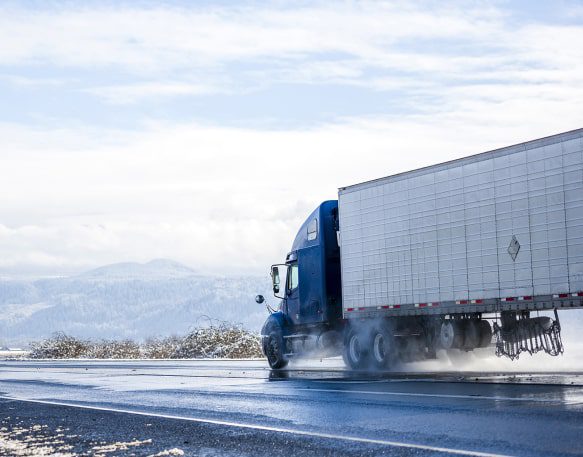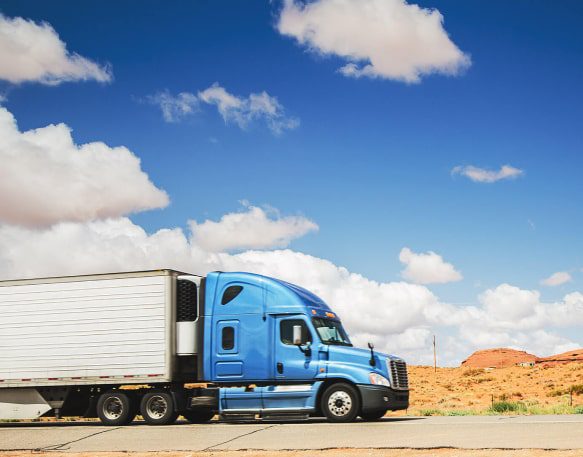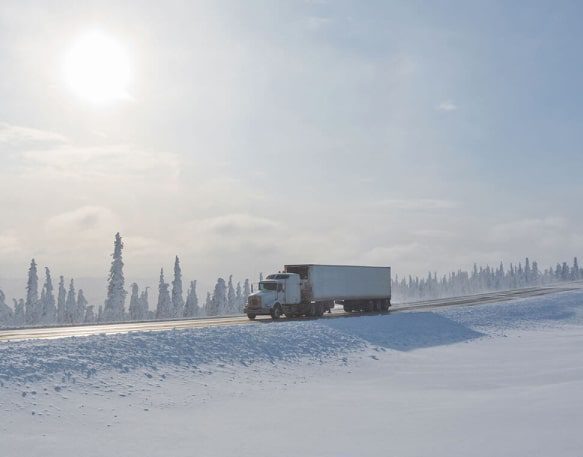But what is trucking authority exactly, and what requirements must carriers and brokers fulfill to earn their operating license? What are the differences between the two?
If you’ve been wondering how to get your own trucking authority or where to get the best trucking authority services, you’ve come to the right place! DAT is your source for all things freight, so let’s go over everything you need to know about MC authority.
What is MC trucking authority?
MC authority, commonly known as trucking authority or motor carrier authority, means that a trucking company has legal authorization from the Federal Motor Carrier Safety Administration (FMCSA) to get paid for transporting goods across state lines via their own trucking company and own vehicle. There are other forms of operating authority as well, such as FMCSA broker authority, which grants permission to facilitate loads between shippers and carriers. Once carriers and brokers get approval for their operating authority, FMCSA registration will then lead to receiving a unique MC number, which they’ll use to carry out their business efforts.
Who needs MC trucking authority?
If you’re looking to become a carrier or independent owner-operator with your own authority, you need an MC number to transport goods across state lines. Importantly, carriers will also need a USDOT number, which is a unique identifier given by the FMCSA to collect and monitor a company’s safety information. This can include safety audits, compliance reviews, crash investigations, and inspections.
Freight brokers are also required to have their MC authority before being allowed to facilitate loads between shippers and carriers. However, the process is a bit different from what carriers and owner-operators have to do. Freight broker authority doesn’t require a USDOT number, but has a number of other requirements, which aspiring brokers should have a clear understanding of so they can get their brokerage started off smoothly.
Who does not need MC authority?
While many carriers are required to get their FMCSA authority, not all of them are. Intrastate carriers, meaning carriers who only operate within the state their company is located, are not required to get an MC number since they are not crossing state borders (but are still required to get a USDOT number).
Additionally, private fleets that are owned and operated by a shipper and never enter into contracts to haul other companies’ freight won’t need MC authority. For-hire carriers, or carriers that transport other people’s freight, will need MC authority for their company drivers and leased-on owner-operators to operate under. Certain for-hire carriers transporting non-regulated cargo and carriers that exclusively work within a commercial zone like the Washington, D.C./Maryland/Virginia area are also exempt from MC authority requirements.
Unless you know that you might end up as one of these types of trucking businesses, carriers and brokers should plan to undergo the application process for motor carrier authority. But what exactly does that process look like?
How is an MC number different from a USDOT number?
One of the major differences in the authority requirements between carriers and brokers is the necessity of obtaining a USDOT number. While brokers do not need a USDOT number for their freight broker authority, a carrier might need both a DOT and MC number, depending on how their business is set up. Carriers are required to get a USDOT number for their trucking authority, whether they are transporting goods across state lines or staying within state boundaries. Meanwhile, an MC number is only needed for interstate operations. If a carrier is only hauling loads within the state where the company is located, they won’t need an MC number.
What are the trucking authority requirements?
Before anything else, carriers and brokers should be aware of the financial trucking authority costs. While it might seem like a lot upfront, these financial requirements are an investment into the future success of your trucking business or brokerage. This can include buying or leasing a truck, registering your business, paying for insurance, application fees, and more. Here are some other main requirements that should be part of your trucking authority checklist:
- Proof of insurance coverage: Brokers are required to obtain a surety bond or a trust fund agreement of at least $75,000, in case of accidents. Carriers, likewise, need to show proof of their own insurance coverage.
- A BOC-3 process agent: A processing agent is an individual or a company that will help you deal with legal documents. It helps the FMCSA easily contact you with any important information, even when you’re away from home base on the road. This is an essential part of starting a trucking business or brokerage and earning your MC authority.
- Application fees: Brokers must pay a $300 fee when they apply for their FMCSA broker authority.
Can you get FMCSA authority without an MC number?
We’ve gone over cases where carriers don’t need to earn their trucking authority, but if you do need it, then you’ll need to get an MC number. Brokers are also required to get an MC number to get their authority.
But earning your MC authority shouldn’t be a deterrent from starting your own carrier or broker business. In many cases, the upsides of having your own authority are greater than if you were using a larger organization’s operating authority.
How to get MC authority
Now, let’s go through each step required for your trucking authority checklist.
- Establish your business
When you apply for your MC authority, the FMCSA registration process will require you to fulfill certain criteria. They’ll be looking at the type of cargo you’re planning to haul, your company type, and more. For that reason, the first thing you need to do is get your Employer Identification Number (EIN) from the IRS and set yourself up as an official business entity. In addition, carriers and brokers will need to be pre-approved for insurance coverage. This is important because if you are denied coverage, you won’t be able to continue with the FMCSA registration process. - Apply for your DOT and MC number
With your business established and all the initial pieces in place, carriers and brokers can then fill out an FMCSA registration form for their MC authority. This includes providing the business information you should have acquired in the previous step. You’ll also need your truck information, including your Vehicle Identification Number (VIN), model year, weight, and more.However, carriers should get their USDOT number before they begin their FMCSA registration. Brokers are not required to get DOT numbers. First-time applicants should register via the United Registration System (URS). Once you’ve obtained a USDOT number, carriers can then proceed with getting their MC authority. - Choose your BOC-3 process agent
For legal purposes, carrier and broker businesses must assign a processing agent — someone who agrees to accept any court papers or legal documents on behalf of your trucking business or brokerage. This can be either an individual agent or a company that offers process agent services. Once your process agent is in place, you should fill out the BOC-3 form to declare your choice to the FMCSA. - File your UCR permit
Once carriers have their DOT and MC number (or just their MC number for brokers), the next step is to file for a Universal Carrier Registration permit, or UCR for short. This is to verify that you have active insurance coverage in the states you will be operating in. Since you need to have your insurance already set up when you’re establishing your business, this should be a straightforward task. You’re also required to already have your USDOT and MC number.Despite the name, brokers must also file for a UCR permit, so long as they are helping carriers transport loads across state lines. This is an important step for carrier and broker businesses, as operating without a UCR permit can lead to severe penalties for you and your company. - Register for IRP and set up an IFTA account
Carriers are required to register for an International Registration Plan (IRP). An IRP is an agreement among 48 states and Canada that lets carriers register their vehicles in one location and then pay apportioned license fees that allow them to operate within other jurisdictions. Fees are based on how much time you operate in each jurisdiction, and can range from $1,500 to $2,000 per vehicle.Carriers must also set up an International Fuel Tax Agreement account, or an IFTA account for short. Carriers are required to register for both an IRP and IFTA account if their vehicles travel between two or more applicable jurisdictions, or if their gross vehicle weight exceeds 26,000 pounds or has three or more axles. - Sign up for FMCSA Clearinghouse drug and alcohol testing
Finally, carriers need to enroll every driver in their organization in a drug and alcohol testing program, which the FMCSA Clearinghouse registration process requires from every driver with a CDL license. It’s essential that drivers maintain compliance with the FMCSA Clearinghouse rules, regulations and driver safety qualifications. It’s not just for the sake of your business, but for the well-being of your drivers and others on the road.Our trucking authority packages include DAT partner CleanFleet, which offers high-quality testing and comprehensive reporting, so that you can educate employees, avoid fines, and keep everyone safe.
Make getting your MC authority easy with DAT!
There are a lot of steps involved in getting your broker authority or trucking authority, and it can take up to 5 to 7 weeks for you to finally get your business up and running. Luckily, DAT Authority helps carriers and brokers earn their authority with no hassle.
Any questions you may have about how to get trucking authority, our experts can answer, and they will work with you to sort out the paperwork, permits, fees, and other requirements. This means you can avoid unnecessary fees or expensive delays and focus on the most important part of your business. And once you’re all set up, the DAT load board can give you access to the largest freight marketplace with the most options, allowing you to find the perfect loads for your business.
Make sure that your trucking business or brokerage starts off on the right foot. To learn more about our trucking authority packages and the other solutions DAT provides brokers and carriers, contact us today!
Let DAT help you get your MC authority
Whether you’re a carrier or a broker, DAT can help you get your MC authority so you can get your business up and running as painlessly as possible. The experts at DAT Authority are ready to answer all your questions, helping you fill out your paperwork correctly the first time around. Discover how DAT Authority can help you start your business today!




